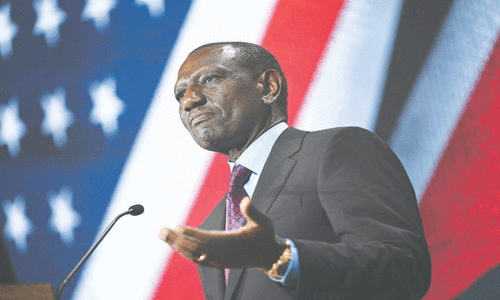LONDON: It was one of the paradoxes of the dirty conflict underway along the Afghanistan-Pakistan border that the Obama administration was far more willing to obliterate leaders of the Haqqani network with drone strikes than to declare them terrorists.
US military commanders see the clan-based militia as America's greatest enemy, responsible for the majority of attacks on its troops in eastern Afghanistan, and they have fought back ferociously with drone attacks against Haqqani bases in the North Waziristan tribal area across the Pakistan border.
Less than two weeks ago a US strike was reported to have killed Badruddin Haqqani, a senior commander in the network and a son of its patriarch, Jalaluddin, a veteran of the war against the Soviet army. The militia insist Badruddin is still alive.
Furthermore, there is no question the Haqqanis have used terror tactics widely against the Afghan population, brutally punishing those it sees as collaborating with the Kabul government and foreign forces, and using kidnapping routinely for fundraising.The Haqqanis are also believed to run a wide array of other money-making ventures in Pakistan and the Gulf, and it is that funding network the Pentagon and the US Congress are hoping to target by the official designation of the clan as a foreign terrorist organisation, which was announced on Friday.
The White House and state department, however, have been largely pushed into making the decision against their will because they believe the only sustainable way out of Afghanistan is through a political solution, which will demand dialogue with all the forces on the ground and in the neighbourhood. The paradox is that while trying to kill the people you know you will ultimately have to talk to is an integral part of both western counter-insurgency doctrine and Afghan martial traditions, the red tape represented by a terrorism designation will be a serious impediment.
US officials have met representatives of the Haqqani network over the last year, according to the special envoy for Afghanistan and Pakistan, Marc Grossman. Any future meetings would now become illegal.
That obstacle could be more serious because the Haqqanis, who profess fealty to the overall Taliban leadership but mostly operate independently, hold one of the important bargaining counters in any future contacts: a captured American soldier, Bowe Bergdahl.
After contacts with US officials last year the Taliban thought Bergdahl would be swapped for five Taliban members held in Guantanamo Bay. The deal collapsed in the face of opposition from Congress and the Pentagon.
Thomas Ruttig, of the Kabul-based Afghan Analysts Network think-tank, argues that the coming US presidential election is the main driver behind the decision on the Haqqanis. “When there are attempts to get talks going again it is a surprising time to do it.”
By arrangement with the Guardian














































Dear visitor, the comments section is undergoing an overhaul and will return soon.